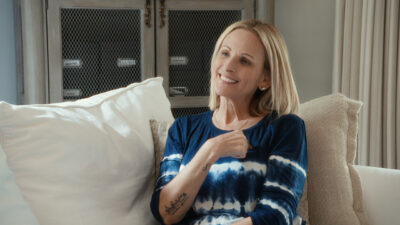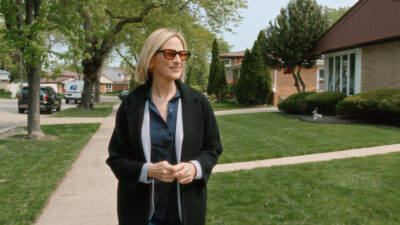Marlee Matlin: Not Alone Anymore opens with Matlin returning to the Oscars 30 years after becoming the youngest and only Deaf performer to win Best Actress. Since being propelled to stardom for her role in 1986’s Children of a Lesser God, Matlin has become an icon within the Deaf community, proving that there is space in Hollywood for inclusive and accessible storytelling.
The documentary helmed by Deaf director Shoshannah Stern premiered in Canada at this year’s Hot Docs Festival and opens today in theatres. It offers an insightful and equally intimate look at Matlin’s trajectory and some of the challenges she encountered after her Oscar win. From Matlin struggling to receive as many job opportunities as her hearing counterparts to becoming a point person for Deaf culture and advocacy at a young age, she was faced with barriers that made her feel alone both personally and professionally.
Matlin sought to change that by using her platform to reshape the industry. She’s pushed for closed captions in film and TV, championed projects where ASL is at the forefront, and continues to stand her ground when it comes to authentic Deaf representation on screen (exemplified in CODA, a film she starred in that won Best Picture at the 2022 Oscars).
In our interview with Matlin and Stern, they discuss how their long-term friendship paved the way for their latest collaboration, what it meant for them to make a visual documentary that was both immersive for Deaf and hearing audiences, and the importance of bringing nuanced Deaf stories to the screen.
Shoshannah, you’ve worked with Marlee prior to making this film about her life. Can you share about how the two of you met and what drew you to reunite with her to direct this documentary?
Shoshannah Stern: I was lucky enough to first work with her the first year I moved to Los Angeles to act. I was maybe 21 or 22. I had not been acting for very long at all when I learned I would be guest-starring with her on a show called The Division, which is featured for a few seconds in the documentary.
There’s something about Marlee’s career and life that has lived within me from the first time I saw her win the Oscar as a very young child. I feel like her story has grown within me as I grew into myself, even though I never dreamed I would be the one to direct it. That decision came from her, and I can’t speak for her on why, but if I had to guess, I think it’s something we both felt instinctively rather than something we could put into words.

Marlee, before you won the Oscar, there weren’t as many roles written specifically for Deaf actors. Since your win, you’ve starred in several films and TV shows, including some where you weren’t accompanied by an interpreter ― as was the case in Switched at Birth. What does it mean to you to have ASL at the forefront of the projects that you take on?
Marlee Matlin: It means that the film and TV community recognizes the richness and diversity of the ASL community and its culture. Speaking of Switched at Birth, everywhere I go, people express their love for the show along with CODA. It just goes to prove that projects featuring ASL front and center can be critically and commercially successful.
One of the documentary’s pivotal moments is learning about your advocacy work for closed captions. You even mention that The Wizard of Oz was your favourite film growing up, and it didn’t have closed captions for a long time. How important has it been to see the changes that you pushed for being implemented in streaming platforms and cable?
Matlin: It has been extremely important. I’m all about inclusion and without captions, me and millions like me would not be able to participate equally when watching TV or film or even online content. Ever since I fell in love with The Wizard of Oz and yearned to know what they were saying — imagine, I had to make up my own story without having the benefit of captions and then realizing the story later was completely different when captions came along — I pushed for the words that would give me access. With the visibility I had as an Academy Award winner, I pushed for access for everyone. Today, captions are everywhere, and Deaf and hearing people watch them.
View this post on Instagram
This is a visual documentary as opposed to a sound-based one. Shoshannah, can you expand on your decision to direct Marlee’s story in this way?
Stern: I hadn’t actually realized before I got this job that the form of documentary as we know it is rooted in sound. After I got the job and was watching documentaries to decide which approach I wanted to take, I tried to visualize how I would tell Marlee’s story the way I’ve always seen documentaries be executed, realizing that would prove to be impossible because she doesn’t tell her story by using her voice, and neither do I.
I chose not to see it as a challenge, but an opportunity to reconfigure the form of documentary as we’ve known it by developing a new way of filming, using earpieces, split screens, sound design, and creative captioning. It felt like something I had to do, because I don’t think you can fully understand Marlee’s story if you don’t understand the way she experiences the world.
Marlee, we love it that in the documentary, you share that CODA was the first time you were adamant about being cast alongside other Deaf actors. You didn’t want to be a part of it if the studio hired a hearing actor to play your husband. How rewarding was it to see that film win the accolades that it did by featuring authentic casting?
Matlin: It was, as I called it, a “no brainer” decision on my part. I knew how important it was to tell the story authentically by casting a Deaf actor. The fact that there are so many Deaf actors out there and Troy Kotsur happened to be one I knew well because of his talent, made all the more sense for me to push for him to be cast. The film simply would not have worked otherwise! Of course, it was validated in the many awards and critical acclaim that the film got.

Shoshannah, there is also a scene in the doc where you and Marlee connect about both of your experiences playing Sarah Norman in Children of a Lesser God, and how your point of view about that story has changed over time. What do you hope audiences will take away from that conversation between the two of you?
Stern: I think there are many things to take away from that, and the way we process films can, and should be, very personal. With that said, I was very inspired by Chimamanda Ngozi Adichie’s TED Talk about the danger of a single story. I talked about it so many times during edits, because like Marlee has been mostly alone as an actor, Children of a Lesser God has been alone as a story. I think stories are typically reflective of the times they live in and the person who tells it, but they should also be afforded the company of others to give them, and audiences, the necessary nuance and space they need. Like people, stories aren’t meant to be alone either.



 Follow Us On Instagram
Follow Us On Instagram
